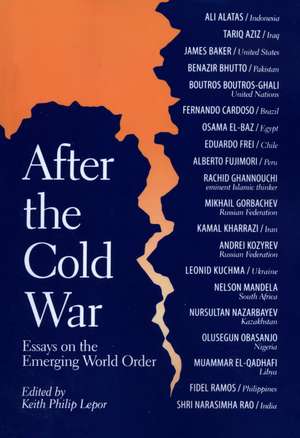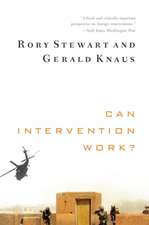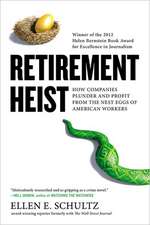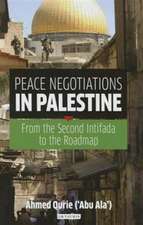After the Cold War: Essays on the Emerging World Order
Editat de Keith Philip Leporen Limba Engleză Paperback – apr 1997
In this book of specially commissioned essays, twenty world leaders assess the possibilities and perils of the new strategic, political, and economic interrelationships that are emerging around the world. They tackle such fundamental questions as: What is the future of the international system as we approach the twenty-first century? What will be the fate of disintegrating nation-states, and how will the international community respond? Has the nation-state outlived its usefulness? Are we beginning to witness the complete breakdown of the international system?
The contributors are:
- Ali Alatas (Indonesia)
- Tariq Aziz (Iraq)
- James A. Baker III (United States)
- Benazir Bhutto (Pakistan)
- Boutros Boutros-Ghali (United Nations)
- Fernando Henrique Cardoso (Brazil)
- Osama El-Baz (Egypt)
- Eduardo Frei (Chile)
- Alberto Fujimori (Peru)
- Rachid Ghannouchi (eminent Islamic thinker)
- Mikhail Sergeyevich Gorbachev (Russian Federation)
- Kamal Kharrazi (Iran)
- Andrei Kozyrev (Russian Federation)
- Leonid Kuchma (Ukraine)
- Nelson Mandela (South Africa)
- Nursultan Nazarbayev (Kazakhstan)
- Olusegun Obasanjo (Nigeria)
- Muammar El-Qadhafi (Libya)
- Fidel Ramos (Philippines)
- Shri P. V. Narasimha Rao (India)
Preț: 262.40 lei
Nou
Puncte Express: 394
Preț estimativ în valută:
50.22€ • 52.29$ • 42.44£
50.22€ • 52.29$ • 42.44£
Carte tipărită la comandă
Livrare economică 10-24 martie
Preluare comenzi: 021 569.72.76
Specificații
ISBN-13: 9780292723405
ISBN-10: 0292723407
Pagini: 344
Dimensiuni: 152 x 229 x 23 mm
Greutate: 0.45 kg
Editura: University of Texas Press
Colecția University of Texas Press
ISBN-10: 0292723407
Pagini: 344
Dimensiuni: 152 x 229 x 23 mm
Greutate: 0.45 kg
Editura: University of Texas Press
Colecția University of Texas Press
Notă biografică
Keith Philip Lepor, of Boston, Massachusetts, is a global business and public policy advisor and consultant to international companies. He holds an M.Litt. in International Relations (Comparative East Asian Economic Development Strategies) from St. Antony’s College, Oxford University, and an M.A. in Middle Eastern Studies from the American University in Cairo.
Cuprins
- Foreword (His Excellency Mikhail Sergeyevich Gorbachev, Former President of the Union of Soviet Socialist Republics)
- Preface
- Introduction (Keith Philip Lepor)
- Part 1. The Post-Cold War Order: Conceptual Foundation
- Toward the Twenty-first Century (His Excellency Nelson Mandela, President of South Africa)
- The Post-Cold War Era: A View from the South (His Excellency Fernando Henrique Cardoso, President of Brazil)
- Part 2. The International System in the Post-Cold War Order
- The United Nations in a Post-Cold War Order (His Excellency Boutros Boutros-Ghali, Secretary-General of the United Nations)
- Challenge and Opportunity in the Post-Cold War Era: Building an International Environment Supportive of Democracy (His Excellency Shri P. V Narasimha Rao, Prime Minister of India)
- The Post-Cold War Era: "Facts and Prospects" (His Excellency Tariq Aziz, Deputy Prime Minister of the Republic of Iraq)
- Part 3. The United States and the Commonwealth of Independent States in the Post-Cold War Order
- Selective Engagement: Principles for American Foreign Policy in a New Era (The Honorable James A. Baker III, Former Secretary of State, United States)
- Russia in the Multipolar World (The Honorable Andrei Kozyrev, Former Foreign Minister of the Russian Federation)
- Kazakhstan and the Commonwealth of Independent States: Inevitable Integration in the Post-Cold War Order (His Excellency Nursultan A. Nazarbayev, President of the Republic of Kazakhstan)
- Ukraine: Identity in the Post-Cold War Era (His Excellency Leonid Kuchma, President of Ukraine)
- Part 4. Regional Divisions in the Post-Cold War Order
- Iran's View of the Post-Cold War Era: Continuity and Change in the Region (His Excellency Dr. Kamal Kharrazi, Ambassador Extraordinary and Plenipotentiary of the Islamic Republic of Iran; Permanent Representative to the United Nations)
- The Age of People Power in the Pacific (His Excellency Fidel V. Ramos, President of the Philippines)
- Peru and Latin America in the Post-Cold War World (His Excellency Alberto Fujimori, President of Peru)
- Pakistan's Foreign Policy: Challenges and Responses in the Post-Cold War Era (Her Excellency Benazir Bhutto, Prime Minister of Pakistan)
- The African Region in the Post-Cold War Global System (His Excellency Olusegun Obasanjo, Former President of Nigeria)
- Part 5. The Nonaligned Movement and the View from the South
- The Nonaligned Movement in the Post-Cold War Order: An Indonesian View (His Excellency All Alatas, Minister for Foreign Affairs of the Republic of Indonesia)
- The Third World and the Post-Cold War Order: Challenges and Contributions (The Honorable Dr. Osama El-Baz, Director for Political Affairs, Office of the President of Egypt)
- Part 6. Ideology in the Post-Cold War Order
- Liberty and Solidarity: Post-Cold War Challenges to Democracy (His Excellency Eduardo Frei Ruiz-Tagle, President of the Republic of Chile)
- A Revolutionary Perspective on the New World Order (His Excellency Muammar Abu Minyar El-Qadhafi, Revolutionary Leader of the Socialist People's Libyan Arab Jamahiriya)
- Islam and the West: Concord or Inevitable Conflict (The Honorable Rachid Ghannouchi, Eminent Islamic Thinker and Leader of the Tunisian Opposition Party An-Nahdah)
- Contributors
Recenzii
In an ambitious attempt to characterize andunderstand the unprecedented changes in the post-Cold War global order, the editor has amazingly collected the perspectives of 20 notable (and busy) world leaders and diplomats. Contributors range from Mikhail Gorbachev (once president of the USSR) and former US Secretary of State James Baker to various Third World heads of state, including Fernando Cardoso (Brazil), Alberto Fujimori (Peru), and Muammar El-Qadhafi (Libya). . . . The selections transcend speechifying and mirror diverse cultural, national, and ideological worldviews.
. . . a number of present or former world leaders, predominantly from the global south, write on the state of the world, where it is heading, and the roles of their countries. Although Lepor regrets the refusal of representatives of the industrailized states to participate, the lacuna is not debilitating: their views are readily available and widely known. This collection's value lies precisely in the unmediated presentation of perspectives from representatives of the global south.
Descriere
Twenty world leaders assess the possibilities and perils of the new strategic, political, and economic interrelationships that are emerging around the world.















